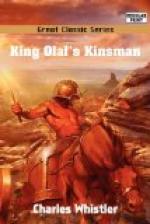“Can you see aught strange here?” she said to me.
I could see nothing but thicket of briar and sloe climbing the steep side of the mound. And therefore she parted them, not easily at first, for none had touched them for long; and there before me was the opening of a low stone-sided-and-roofed passage, leading to the heart of the mound.
“Enter,” she said. “This is our hiding place in sorest need.”
“Hardly dare I do so. It is ill to disturb the mighty dead,” I answered.
“The dead queen has sheltered us helpless women well,” she answered. “She is not disturbed, for this is not her resting place.”
So I went in, stooping double, for the stone passage was very low. I cannot tell whence the stone came, nor why the place was made unless it were to receive some chiefs of the Iceni, whose bones were gone had they ever been there, for there was a stone chamber in the mound’s heart, fitted with stone seats and stone beds, as it were, and four people might well live in that place, for it was cool in summer and warm in winter, but very silent.
I spoke not a word till we were in the sunshine again, and then I shivered.
“I could not have entered that place alone,” I said.
“Gunnhild had no fear thereof, nor had I as a little child. Three times we bided there for days, while the Danes pillaged and burnt all around us, and were safe.”
It was some old secret handed down to Gunnhild that had taught her how to find the passage entrance. But she knew not where the great queen lay. Maybe her resting place is below the mound itself, or maybe she lies elsewhere, as some say.
Then said I:
“Let us close the place. I pray that none may need it again.”
So I loosened the earth above with my spear butt and it fell and covered the doorway. And none, save Hertha and myself, know where its place is.
Yet men say that they see the bale fires burning even now, on the mound top on the nights when men look for such things. I have never seen them.
There are two men of whom I must say a word, for I love them well. One is Father Ailwin, our priest, and my old master—who bides here with Oswin, whom I prayed to stay with us also—growing old peacefully; and the other is Elfric the abbot, my friend ever, and now Cnut’s best adviser. Each in his own way fills well the place that is his, one as the counsellor and friend of plain folk like ourselves, winning the love and reverence of thane, and franklin, and thrall alike; and the other as the wisest in the land maybe, high in honour with all the highest in church and state. Well have those two wrought, and we cannot do without their like, whether in village or court.
It is likely that Elfric will be archbishop ere long, and that will be well for us all. So great is the name of Cnut the king that hereafter it will be that all that was wrought of wisdom in his time will be laid to his account; but he would not have it so, for he knows what he owes to Elfric. But also I think that the cruel deeds wrought by the jarls while he was yet but a child will be thought his work also, for men will forget how young he was when the crown came to him, seeing that in utmost loyalty the jarls spoke of him ever as commanding, as the old viking ways bade them.




